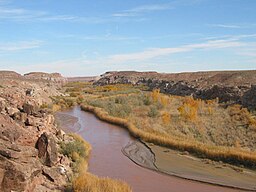Fremont River
| Fremont River | |
| river | |
|
The Fremont River near Caineville, looking south
|
|
| Country | United States |
|---|---|
| State | Utah |
| Region | Sevier and Wayne counties |
| Source | |
| - location | Johnson Valley Reservoir |
| - elevation | 8,819 ft (2,688 m) |
| - coordinates | 38°36′32″N 111°37′56″W / 38.60889°N 111.63222°W |
| Mouth | Dirty Devil River |
| - location | near Hanksville, Utah |
| - elevation | 4,250 ft (1,295 m) |
| - coordinates | 38°24′10″N 110°41′35″W / 38.40278°N 110.69306°WCoordinates: 38°24′10″N 110°41′35″W / 38.40278°N 110.69306°W |
| Length | 95 mi (153 km) |
| Basin | 751 sq mi (1,945 km2) |
| Discharge | for Bicknell |
| - average | 83.9 cu ft/s (2 m3/s) |
| - max | 1,360 cu ft/s (39 m3/s) |
| - min | 18 cu ft/s (1 m3/s) |
The Fremont River in Utah flows from the Johnson Valley Reservoir, which is located on the Wasatch Plateau near Fish Lake, southeast through Capitol Reef National Park to the Muddy Creek near Hanksville where the two rivers combine to form the Dirty Devil River, a tributary of the Colorado River. The river is 95 miles (153 km) long.
The Johnson Valley Reservoir is fed by Sevenmile Creek (from the north) and Lake Creek (from the southwest). The Fremont River passes through Fremont, Loa, Lyman, Bicknell, Teasdale, and Torrey and provides year round irrigation for the agricultural lands of Rabbit Valley and Caineville. Then it heads through Hanksville and afterwards to its mouth.
The Fremont River has a drainage area of 751 square miles (1,950 km2) fed by spring snowmelt off Thousand Lake Mountain, Boulder Mountain, and the northern Henry Mountains. The river is named after John Charles Fremont. It gives its name to the Fremont culture, a Precolumbian archaeological culture.
Flow (ft^3/s), by month (1977–2003), at Bicknell gauging station:
...
Wikipedia

